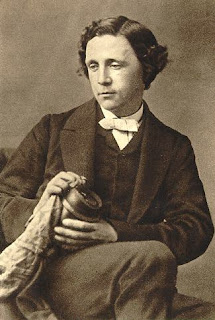For its appearance and lilt that suggest but the purest of simplistic beauties, and its genius technique and allusions, this poem is perhaps Lewis Carroll's greatest piece of poetry. It also represents everything that Carroll thought and felt of/for Alice Pleasance Liddell, the inspiration, subject, and protagonist of the two Alice books. While it is certainly the opposing end-paper to Looking-Glass's introductory poem, it is, I believe, far more doleful, and in that regard, much more reminiscent of the melancholy winter outside the windows of chapter 1, kissing at the panes, but forever distant. The first poem appropriately and artfully introduces the book, and also sets well the tone of this new distance yawning between him and his Alice; the closing poem indeed closes it all, shuts the book, but dog-ears the corner. After the crowning, after the fireworks, after her waking, he steps back, sits, and allows himself the nostalgia of watching her distantly, under the clouds.
Of course, the poem is most famous for being an acrostic featuring Alice Liddell's full name. Notice also that "Alice" begins the central line of the poem, and more, this is where she is moving "phantomwise," "under skies." Some believe that the meter, if not the tercets (which serve the 21 letters of Alice's name), and the renewed reminiscence of rowing, matches the anonymous verse of "Row, Row, Row Your Boat." If you hold this thought and go all the way back and reread "All in a Golden Afternoon," you'll see that the girls there are referred to, appropriately, as a "merry" crew, but this masterpiece is far from merry. He longs for the past, when things were so.
Finally, consider the last line. Hold it up against the Red King and Alice's predicament remembered at the end of the final chapter. What do you think?
Of course, the poem is most famous for being an acrostic featuring Alice Liddell's full name. Notice also that "Alice" begins the central line of the poem, and more, this is where she is moving "phantomwise," "under skies." Some believe that the meter, if not the tercets (which serve the 21 letters of Alice's name), and the renewed reminiscence of rowing, matches the anonymous verse of "Row, Row, Row Your Boat." If you hold this thought and go all the way back and reread "All in a Golden Afternoon," you'll see that the girls there are referred to, appropriately, as a "merry" crew, but this masterpiece is far from merry. He longs for the past, when things were so.
Finally, consider the last line. Hold it up against the Red King and Alice's predicament remembered at the end of the final chapter. What do you think?
A BOAT beneath a sunny sky,
Lingering onward dreamily
In an evening of July —
Children three that nestle near,
Eager eye and willing ear,
Pleased a simple tale to hear —
Long has paled that sunny sky:
Echoes fade and memories die:
Autumn frosts have slain July.
Still she haunts me, phantomwise,
Alice moving under skies
Never seen by waking eyes.
Children yet, the tale to hear,
Eager eye and willing ear,
Lovingly shall nestle near.
In a Wonderland they lie,
Dreaming as the days go by,
Dreaming as the summers die:
Ever drifting down the stream —
Lingering in the golden gleam —
Life, what is it but a dream?

Tidak ada komentar:
Posting Komentar